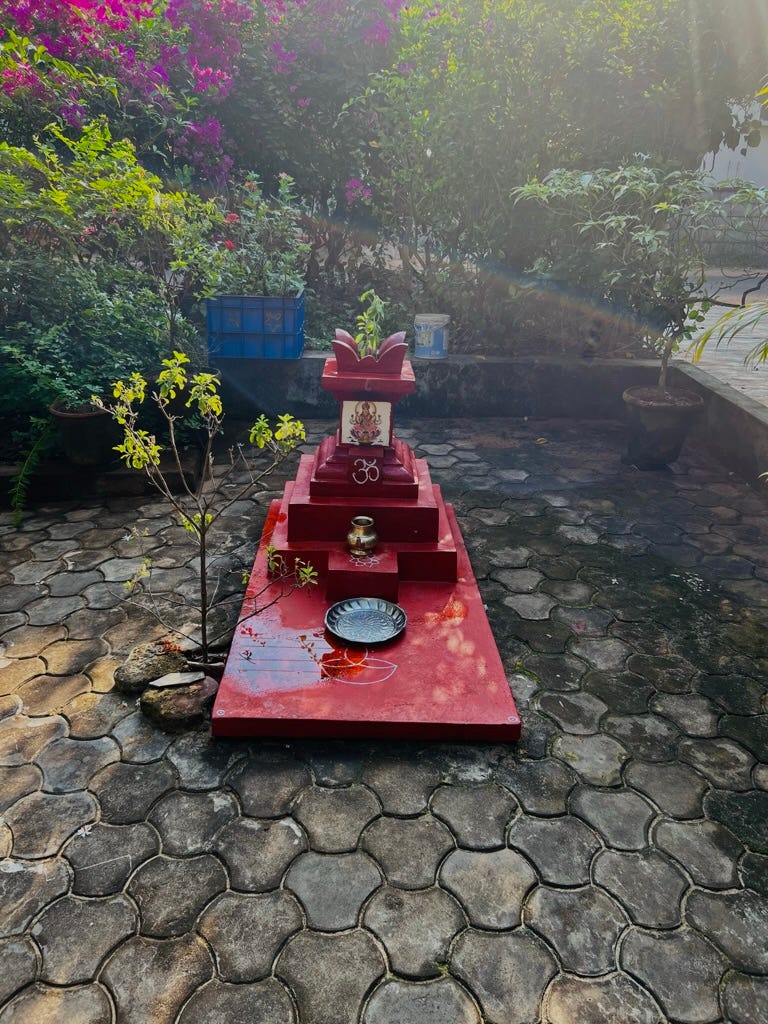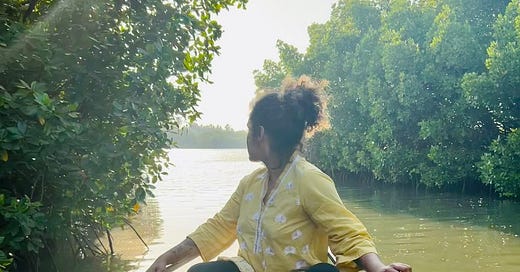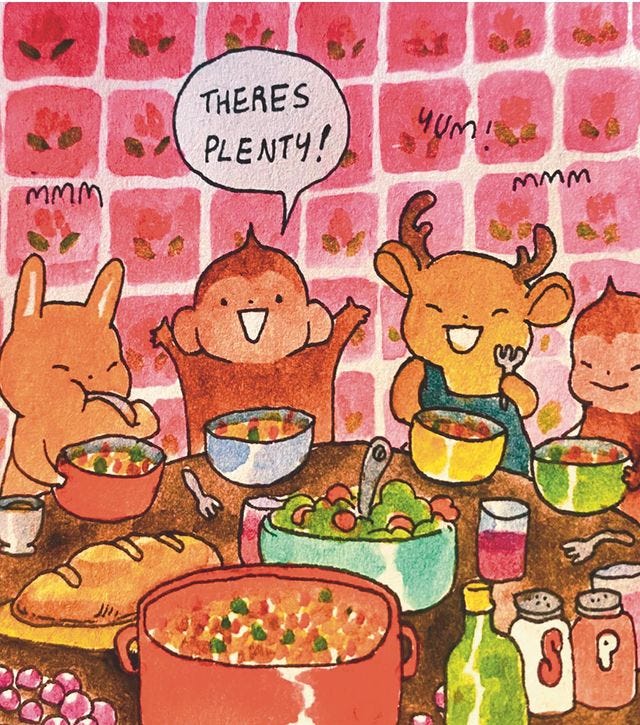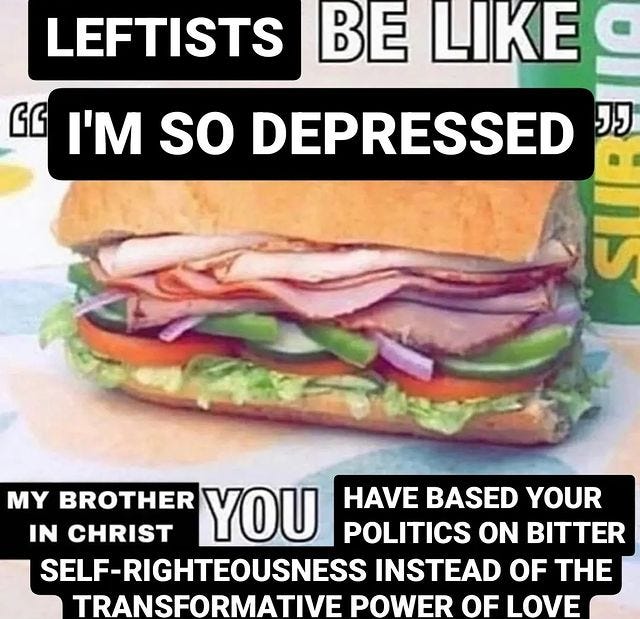Revolutions are made up of 'ordinary people' like you and me
+ You cannot heal on a schedule. It is a slow, incomprehensible process
Today’s newsletter:
2 major realizations I’ve been brewing on for a long time:
Regular, ordinary people in our daily life are our greatest sources of knowledge & inspiration
Putting people on pedestals hurts everyone & not doing it can be freeing
For paid subscribers: Some unfiltered personal thoughts about struggles I’m currently navigating & the unexpected lessons I repeatedly come back to
‘Regular’ people that you build relationships with will be your greatest inspiration
One of the most common questions I get asked is “Who & what are the greatest influences that have shaped or impacted your work?” In response, people often expect me to give them a list of famous writers, revolutionaries, movement leaders, notable anarchist/ abolitionist thinkers, researchers, philosophers, or prominent artists.
In a world that may sometimes feel burdensome, draining & hopeless, it is understandable that we are seeking inspiration, ‘life-changing’ knowledge or profound answers to our plight (the contradiction is we also often want these answers to be simple). Sometimes, we are looking to people in positions of authority— whether it be moral, political or creative, for solutions to our problems. Other times, we simply want to look up to people who have already been celebrated, admired by many & put on a pedestal. It may give us a sense of belonging in a disconnected society with systems that profit off of loneliness & isolation. It may gives us some comfort or sense of security. I get it. I really do.
“Who are your greatest inspirations?” I could curate a list of prominent figures with recommendations of popular books, publications, etc. Maybe that would make me sound more like an intellectual. But I’m afraid my honest, genuine answer may disappoint you. The reality is— it is ordinary people I have been in relationships with that have most heavily influenced and shaped not just my work but me as a being. From my friends, co-organizers, collaborators, mentors to my partner, children like my cousin Zoya, my grandmas & my mentees- these are the people who have taught me in real time what community care means in a million different, nuanced, complex ways.
Even people who I merely crossed paths with have changed the trajectory of my life through simple interactions. People who are no longer in my life, including those who may have been sources of pain, have also been instrumental in my growth. When I look in the mirror, I see a collage of all the beings, relationships, moments, interactions that come together to collectively make me. I am them. I am not dismissing prominent thinkers or writers— I have no doubt learned a lot from many of them. Artists from past or present, ancestral knowledge like cultural traditions have helped me move through hardships & given me solace. However, when it comes to the foundation of my work and the details, I have arrived to them by practicing in relationships, being open to the lessons others teach me by merely existing & being who they are. Of course, a couple of my friends happen to be relatively ‘well known’ on social media because of the work they do. I admire them. I read their newsletters, learn from their actions, listen to their podcasts, heal thru their art, cackle at their memes, am uplifted by their mere existence. But, they have transformed me through the relationships we have built together, by collaborating on issues we are deeply passionate about, being vulnerable with each other, and showing up for each other consistently even from afar. The most beautiful thing is that we have changed each other. We have taught each other so much.
Anarchist praxis is learning from the beings we’ve been socialized to perceive as “inferior”
In the chase of inspiration from famous people, we often overlook the profound knowledge that can come from “regular” people right in front of us & around us. To be clear- I use the word “regular people” with the utmost respect. I am an ordinary person. There is an inherent negative connotation to words like ordinary, regular, common. It is because of what it means to be exceptional, famous & prominent under capitalist/ colonial systems. To be famous means to be considered “superior” in some way. People are selectively applauded, celebrated, praised for certain accomplishments, accolades, awards or milestones that would qualify them as “successful” in a capitalist society (i.e. they have conformed well to a hierarchical system). It is the things that are NOT celebrated or glazed over that tell us a lot. If we are solely or disproportionately seeking knowledge from sources that are uplifted as “superior”, we are dismissing & neglecting the life-sustaining lessons we need to learn from the many beings considered “inferior”.
For example- CHILDREN. Children are the most vulnerable, marginalized, oppressed population around the world. They… no WE… are born into a world (without choice) and then deprived of the right to live. We are socialized, coerced & brutalized under systems & cultures of oppression. “Stop acting like a child” “I’m an adult, I know what I’m doing” It is so exceedingly normalized to think that children have nothing to offer but their obedience & naivety. Adults who don’t conform or assimilate are categorized as children. The adult-child hierarchy is instrumental to upholding & driving capitalism/ colonialism. It is the epitome of “the oppressed go on to oppress”.
We were all once children and yet we have all in some ways been complicit in the oppression & repression of children even if it was indirect. It is in conversation with children that I have come to the most profound realizations. They perceive the world in more open, explorative, liberating ways than many adults do (given how we’ve been socialized) and I have realized how wrong I’ve been about many things when I’ve tried to learn from them. Often, they give me boundless hope & faith in a better world just by already embodying liberation in so many ways.
I was telling Zoya, my then 6-year old cousin, certain relationship problems I was struggling with not knowing what to do. She simply asked why I don’t go out and play with my friends more, or do some taekwondo with her & follow along as she guides me, listen & sing along to my favorite music, get my hands dirty in some dirt or silly putty, just dance, smell the daal cooking in the kitchen… & some would call this somatic embodiment or whatever fancy word you want to assign to the act of living in community. We ended up jumping on a trampoline together, talking about connection to land & how our bodies are ecosystems just like rivers or forests, home to trillions of microbes. I find it easier to talk to children about these concepts because many times, they tend to be more open & less afraid of thinking deeply about the hard questions like “why are we here?” And they arrive at profound answers like “well we’re here to take care of each other & play”. It all seems so intuitive to them. Watching kids exist, grow, traverse the world with more hope than rage & with more bold curiosity than fear, ultimately pushed me to focus more on building community care rather than just dismantling systems.
I have learned from flora, fauna, microbes & the land. Non-human beings or the land itself from soil & sand to rocks & oceans— capitalism/ colonialism thinks they are inferior objects that can be exploited to no end (as are we). But it is through observing & cherishing them, caring for them & understanding nature with more humility that I have learned the most integral lessons on collectivism, abundance, resource sharing, & collaboration. I’ve understood inter and intra-species collaborations best my observing both my land-based community’s traditions or ocean stewardship methods and by understanding underground forest mycorrhizal root networks that facilitate communication, collective adaptation & cooperation between various fungal and plant species. I was inspired to understand how many human sicknesses emerge from our disconnection to land by observing how plants, mammals, birds, insects, etc adapt to seasonal shifts in nature. Understanding how the land is hurting helped me realize that the same systems are behind both the land and humans being sick.
Anarchy is already the way nature functions so drawing inspiration from it seems intuitive. However, when someone is waiting for me to drop a famous name or book, how “cool” is it for me to say that I began to truly GET anarchy by studying & honoring microbial communities? Maybe, that is the coolest thing. The solutions are already here. They’re all around us if we’re open to receiving knowledge from the universe with humility. Children & the land have taught me how so much of healing comes from merely being, practicing & existing in community even if we may not intellectually understand every single step. Do we need to? Isn’t freedom a felt, embodied, collective, abstract, complex journey rather than an intellectual pursuit with a defined point of arrival?

The revolution is not as glamorous as it may be hyped up to be but that means it is more accessible to us than we think
Activism is often framed as an action you engage in that is “external” to you. However, activism is what we do in our daily actions & relationships. The personal really is political. Our relationships are revolutionary. I don’t mean this metaphorically or as a nice sentiment, though it is. I mean in practicality— change occurs at fundamentally microscopic & relational levels. We change the world by changing the threads that allow us to relate to each other. We are shaped by the world & yet, together we shape it & co-create it. While we may have to go to work to pay rent or eat, we can also choose to practice liberation in how we act towards each other. Prisons & police are predicated on us being carceral with & policing each other in our relationships. We practice how to not respond to harm with punishment & work thru conflict in a more transformative way defined by dignity & compassion AND THEN prisons fall. Gradually, slowly, we build in big & small ways. In many moments or niches of our life, we may already be practicing liberation or living in it, not just working towards it.
Strong, reciprocal relationships are the molecules that make up strong communities. & strong communities are free.
The revolution will not be some grand, large-scale, brief, sudden, acute, publicized, televised, moment where we go from oppression to freedom. It will not just be the militant burning down of corporate towers or political estates or ivory towers or cop cars. It will be so much more than that and it will be slow, gradual, complex, and sustainable. It also means each step towards it will be critical and each moment we practice how to be free allows us to be more rooted in freedom. Strong relationships ultimately allow us to be more militant safely because we are together & harder to suppress or manipulate. Armed resistance is more effective when we’re emotionally intimate & deeply connected to each other. In glamorizing the revolution as some hypothetical utopia of tomorrow, we overlook the daily revolutionary moments, lessons & acts of care or mutual aid that we can engage in today. Our most important lessons come from the humble process of building reciprocal relationships.
Why do we put people on pedestals?
Hierarchies are the backbone of capitalism/ colonialism. From people fawning over rich celebrities or leftists who hero-worship dead, white, academics or state rulers… to inequitable relationships where someone is framed as “perfect” - putting people on pedestals is what we are taught to do. We idealize people based on crumbs of information we gather & make sweeping assumptions about the rest based on our limited perception of the world. We so badly want people to fit the ideal caricature or image we have of them in our heads. We’re so used to being coerced, manipulated, exploited by authority figures, that looking “up” to people to tell us what to do can be our default. Oddly, it often distracts us from the most accessible solutions that are right in front of us & in the natural world around us.
What about the people who are put on pedestals? I often get thrust onto pedestals by the sheer nature of what it means to have some sort of social media presence. It is genuinely wholesome to hear how my work impacts people but I’ve also realized how damaging it can be when people reduce you to the things they see as “worthy” of praise. People often seek big answers or fulfillment from me in ways that are reductive. I don’t have a formula. It is also degrading & selectively measures or evaluates me based on things that may be perceived as “achievements” while erasing the pain, lifetimes worth of past & ongoing struggles, mistakes, learning curves and messiness that is the fabric of my work. Or in some way, those struggles are glorified or hailed as a metric of strength or resilience. I haven’t read a few books, researched & concocted a “community care” or “decolonizing medicine 101” manual in a lab— this work is who I am and it has taken every iota of my body, soul & being to do this. It has taken the collective effort of so many beings who’s teachings merged to create me. I am still figuring out HOW to do this. I am still suffering while I provide aid & guidance to others who are hurting. That’s what allows me to dismantle hierarchies within the framework of healing. I will need help for the rest of my life. I will need my community to hold me accountable & aid me eternally, as will you.
This realization has pushed me to be more honest, open and authentic about my struggles in my work. I write about deeply personal aspects of my life. When I work with people 1 on 1, they know a lot about my hurdles, pain points and burdens. This isn’t a 1 sided savior dynamic where I just shell out advice extracting vulnerable, heavy information about someone while I pretend to “have it together”. The best way to give care is to be vulnerable enough to receive it & share yourself with someone. I want to serve as a mentor or guide or healer because it is an intimate relationship— one that also gives ME meaning & purpose. Care-giving heals me.
I get compliments like “It’s amazing, you look like you’ve figured out how to do this!” or “I love your brain!” or “I don’t know how you do all this!” and in all these cases, part of me wants to get on the floor, bow & humbly express my gratitude but another part of me wants to scream & cry. Even if I write about my problems, the reality is most people who read my work selectively see the tip of the iceberg of who I am & make an assessment based on that which means I often get categorized as a “great” person or a “horrible” person. Both these polarities are degrading. People can’t see the full extent of my pain, suffering, grief, loss, confusion, numbness or anguish. They also don’t see the full extent of my clownery, goofiness, dark humor, or many day-to-day actions that make me me. When you do this work by pouring your life & soul into it— it takes a toll. It is also freeing & a big reason I am alive. However, I want the grace to make mistakes. I want the grace to be just one piece of the puzzle. I want you to realize that you can contribute just as much to collective liberation as I can by learning & practicing in community. I want people to understand that I am wholly ordinary. I am you. I am not a role model that is perfectly, fully healed. I am not a good story of a poor kid who figured it out. I’m a mess & I deserve the dignity of not being put on a pedestal… as do you.
When I write, I am hoping to resonate with someone and help build community care but I am also hoping you can hold space for me. I am fine tuning my approach to decolonized healing as I write this. So even if you don’t think you’ve “done much” to contribute to this, know that you giving me the space to be complex and supporting me even when I am most un-palatable is why I’m still here. It takes a village— not a few “exceptionally talented” people. It takes all of us.
You cannot heal on a schedule
I always underestimate the impact of the ingrained capitalist/ colonial clock in our bodies that considers doing things “fast” as the “best” way to do it. Capitalism in our bodies feels like constant acceleration, urgency, speed & slowing down is associated with weakness, shame & guilt. Time & time again I’m forced to reckon with my body’s limitations that I have been socialized to override or dismiss. I’ve been physically, spiritually, emotionally hurting extra since I returned from our coastal village in South India and processing this grief has “slowed” me down considerably.
Keep reading with a 7-day free trial
Subscribe to Cosmic Anarchy to keep reading this post and get 7 days of free access to the full post archives.












